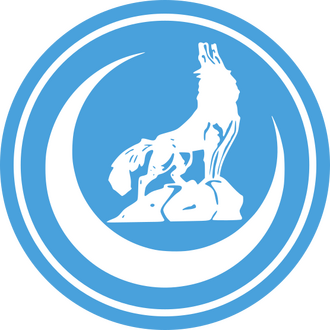
|
The Grey Wolves, officially known as Ülkü Ocakları, are a Turkish far-right ultranationalist organization. They are commonly described as ultranationalist and/or neo-fascist. A youth organization with close links to the Nationalist Movement Party (MHP), it has been described as MHP's paramilitary or militant wing. Its members deny its political nature and claim it to be a cultural and education foundation.
Established by Colonel Alparslan Türkeş in the late 1960s, it rose to prominence during the late 1970s political violence in Turkey when its members engaged in urban guerrilla warfare with left-wing activists and militants. Scholars have described it as a death squad, responsible for most of the violence and killings in this period. Their most notorious attack, which killed over 100 Alevis, took place in Maraş in December 1978. They are also alleged to have been behind the Taksim Square Massacre on May Day, 1977. The masterminds behind the Pope John Paul II assassination attempt in 1981 by Grey Wolves member Mehmet Ali Ağca were not identified and the organization's role remains unclear. Due to these attacks, the Grey Wolves have been described by some scholars, journalists, and governments as a terrorist organization. The organization has long been a prominent suspect in investigations into the Turkish "deep state", and is suspected of having had close dealings in the past with the Counter-Guerrilla, the Turkish branch of the NATO Operation Gladio.
A staunchly Pan-Turkist organization, in the early 1990s the Grey Wolves extended their area of operation into the post-Soviet states with Turkic and Muslim populations. Up to thousands of its members fought in the Nagorno-Karabakh War on the Azerbaijani side, and the First and Second Chechen Wars on the Chechen side. After an unsuccessful attempt to seize power in Azerbaijan in 1995, they were banned in that country. In 2005, Kazakhstan also banned the organization, classifying it as terrorist.
Under Devlet Bahçeli, who assumed the leadership of MHP and Grey Wolves after Türkeş's death in 1997, the organization has been reformed. The organization has also been active in the Turkish-controlled portion of Cyprus. It has affiliated branches in several Western European countries with significant Turkish populations, such as Belgium, the Netherlands, and Germany. According to a 2014 estimate, the Grey Wolves are supported by 3.6% of the Turkish electorate. Furthermore, the Grey Wolves have had considerable success in some Turkish elections such as the parliamentary elections in 1999 where the Grey Wolves garnered 18% of the national vote.
